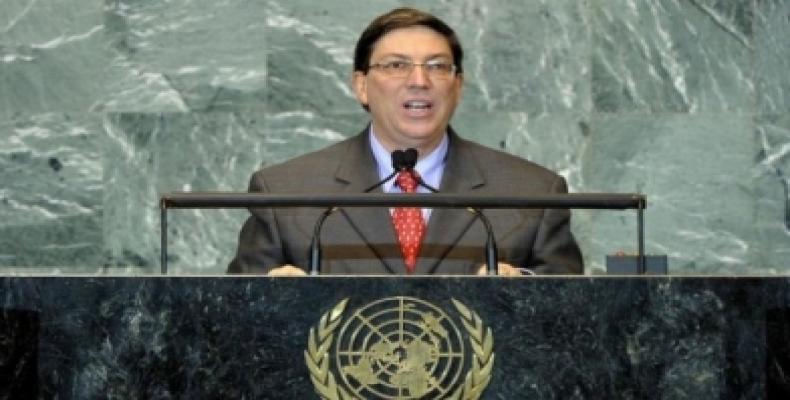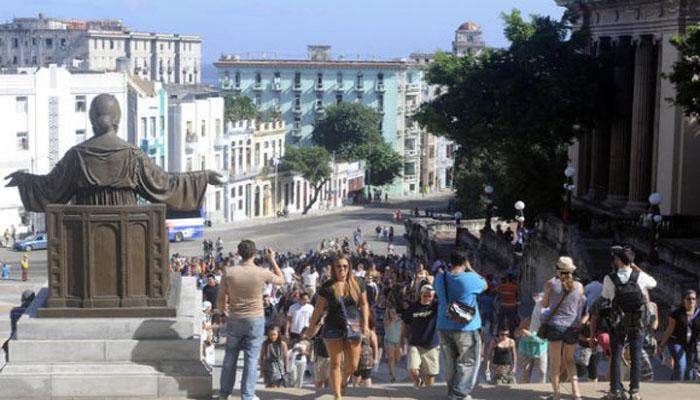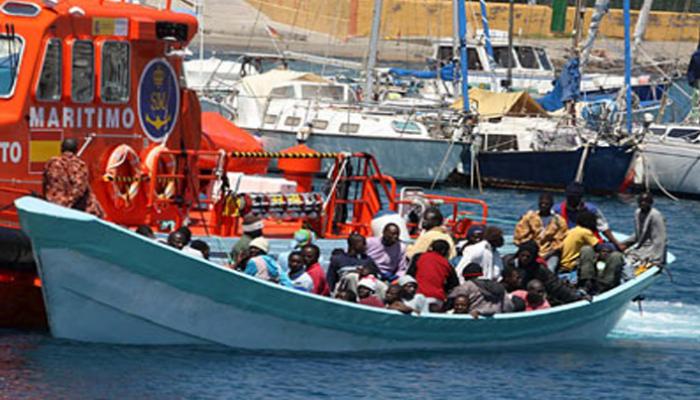
There is a domestically troubling reality in the US of rising public concern over the US military prison in Guantánamo, Cuba. Is there some background on the case to get the ball rolling? Abu Wa’el Dhiab, a Syrian who has been cleared for release from Guantánamo since 2009, is challenging the US military’s practice of feeding detainees on hunger strike through tubes inserted into the stomach through the nose. He and other detainees consider the feeding to be torture, and request an end both to it and to Guantánamo guards forcibly removing them from their cells for the treatment. Dhiab and an undisclosed group of detainees are on hunger strike to protest against their incarceration without charge.... More

Washington, October 29 (RHC-PL) -- The U.S. and Israel have once more remained alone against the world regarding the blockade against Cuba, according to a new article published in The New York Times on Wednesday.... More

Statement by H.E. Mr. Bruno Rodríguez Parrilla, Minister of Foreign Affairs of the Republic of Cuba, on item 40 of the agenda of the 69th session of the United Nations General Assembly entitled: “Necessity of ending the economic, commercial and financial blockade imposed by the United States of America against Cuba”. ... More

The run up to the election was anything but placid!. After a tight race, marked by innumerable twists and turns, not the least when the main opposition candidate Eduardo Campos was killed in a plane crash on the campaign trail, Brazil’s left-wing president, Dilma Rousseff, was re-elected on October 26th to a second four-year term with 51.6% of valid votes. Aécio Neves, of the centre-right opposition, won 48.4%. It is the fourth election in a row won by her Workers’ Party the PT.... More

The U.N. General Assembly on Tuesday takes up a resolution on “the necessity of ending the economic, commercial and financial embargo imposed by the United States of America against Cuba.” The assembly, for the 23rd straight year, is expected overwhelmingly to condemn the U.S. policy. Last year, the vote was 188-2, with Israel joining the U.S. in supporting the status quo.... More

Next Sunday´s presidential elections in Brazil will undoubtedly will not only bring a president, because their result will have a direct impact on regional integration blocs like South Common Market (Mercosur) and the Union of South American Nations (Unasur).... More

As Shakespeare would describe the situation, the “dogs of war” have been unleashed between the US, NATO and the Islamic Republic or ISIL. ... More

Republican House Speaker John Boehner has characteristically come out with his opinion that the U.S. may have "no choice" but to send American troops to fight ISIL if Obama's strategy fails. ... More

Let's take a look at he first item on the long list of issues to be addressed at the United Nations General Assembly in New York this week: Climate change. ... More

Journalists at RHC have been monitoring the economic implications of the United States blockade of the island ever since estimates were made available and as the years roll by, the effects of the blockade on sensitive, specific areas of Cuban society have emerged with painful clarity. One such sector is the construction industry in Cuba.... More

Cuban education was nationalized in 1959 at a time when less than half the children had access to education. Today the island has the highest literacy rate in the world. This privilege comes at a cost of loyalty to the state, and an obligation to do community service and for males, military service. In other words, the Cuban educational ethos is built on giving back.... More

The 5 key factors behind Cuba’s rapid transition to sustainable agriculture are strong scientific capacity, farmer literacy, solid agricultural extension, large cooperatives, good soils, water and of course climate.... More

Around the globe, the International Year of Family Farming, or the IYFF’s National Committees are continuing to work towards improving conditions for family and small-scale farmers.... More

The birth rate in Cuba, which had been in the mid-20s per one thousand of the population during the 1950s, climbed to the mid-30s in the years immediately following the Cuban Revolution. Starting in the late 1960s it declined to reach a low of 14 per one thousand in 1980, one of the most rapid declines on record. And the most recent statistics show that, today the problem is still a grave one.... More

In Italy between August 2013 and July of this year, 117,000 African migrants have arrived by boat, crafts both large and not so large.... More
More Views
- Granma seeks alternatives to continue classes in earthquake-affected centers, with teachers offering their homes
- Annual solidarity conference of National Network on Cuba underway in U.S. city of Detroit, Michigan
- World Bank reports Israel’s aggression inflicts $8.5 billion in economic losses on Lebanon
- Cuba denounces and warns of indiscriminate Israeli attacks in Damascus and Beirut, including near Cuba's diplomatic headquarters
- Africa: International conference in Niger supports anti-imperialist struggle of Sahelian peoples

